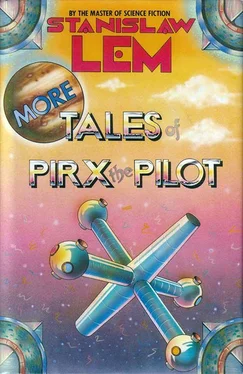When that happened, he was left with only Massena for company, and he might have actually become pals with this clear-eyed, dark-haired man, except that Massena was high-strung, and Pirx had always had trouble with high-strung types, deep down distrusting them. And Massena had his tics: his throat needed constant examining, a twinge in his joints meant a change in the weather (not one of his prognostications had ever come true, but that didn’t stop him from making more); he complained of insomnia and made a point of scrounging pills every night, pills that he never took but placed beside his bunk, the next morning swearing to Pirx—who read till all hours and could hear the man snoring peacefully away—that he hadn’t slept a wink, and apparently believing it. Otherwise, he was a topflight specialist, a whiz of a mathematician, and a born programmer. He was also in charge of the computerized, unmanned surveying program now under way. He even made a hobby of it, working on one of these programs in his spare time, which rankled Krull no end: the man did his job so well and so quickly that he actually had time to spare, and he couldn’t be reproached for neglecting his duties. Massena was all the more valuable in that, paradoxically, their planetary mini-expedition included not a single certified planetologist; Krull was anything but.
It was as remarkable as it was distressing, the degree to which, with no special effort on anyone’s part, relations between three basically normal, ordinary individuals could become so embroiled in those rocky barrens that were the southern tableland of Iota Aquarius.
To the team belonged one other member, a nonhuman one—the afore-mentioned Aniel, a nondigital robot, one of the latest Earthside jobs to be developed for fully automated land probes. That Massena was there as a cyberneticist was an anachronism—because of a regulation which provided that where there was a robot, there had to be a repairman. Now, regulations, as everyone knows, are seldom updated, and this one was ten years obsolete, since, as Massena himself was often heard to quip, the robot stood a greater chance of repairing him than vice versa: not only was it infallible, it was also medically programmed. Pirx had long ago observed that a man could be judged better by his behavior toward robots than toward his fellow man. Pirx belonged to a generation born into a world of which robots were as natural a part as spaceships, though acceptance of robots was tainted with vestiges of irrationality. There were those, for example, more easily infatuated with an ordinary machine—with their own car, say—than with a thinking machine. The era of unbridled modular experimentation was waning, or so it seemed, and construction was now limited to two types: the narrowly specialized and the universal. Only a fraction of the latter were human-shaped, and only because, of all the models tested, those patterned on nature proved the most functional under conditions simulating planetary exploration.
Engineers were never gratified to see their products manifest the kind of spontaneity that grudgingly bespoke an inner life. Popular wisdom held that robots could think but were devoid of any personality. Admittedly, no robot had ever been known to throw a fit, go into ecstasies, laugh, or cry; they were perfectly balanced, just as their constructors had intended them to be. But because their brains were not mass-produced, because they were the product of a laborious monocrystallization susceptible to wide statistical variability and minute molecular shifts, no two were ever created exactly alike. So they were individuals, then? Not at all, replied the cyberneticists, merely the products of a random probability—a view shared by Pirx and by just about anybody who had ever rubbed elbows with them, spent years in close quarters with their thinking, with their always purposeful, logical bustle. Though more similar to one another than to humans, they, too, were subject to whims and predilections; some, when called upon to execute certain commands, even practiced a kind of passive resistance—a condition that, if it persisted, was remedied by a general overhauling.
In his attitude toward these quaint machines, so punctilious, at times even ingenious in carrying out orders, Pirx, and probably not he alone, had a not altogether clear conscience, perhaps a throwback to his navigational stint on the Coriolanus. In Pirx’s mind there was something inherently unfair, something fundamentally wrong, about a situation whereby man had created an intelligence both external to and dependent on his will. A slight unease, difficult to define, yet nagging at his conscience like an unbalanced equation or a bad decision—bluntly put, the sense of having perpetrated a very clever but nonetheless nasty trick. In the judicious restraint with which man had invested these cold machines with his cumulative knowledge, granting them only as much intelligence as was required, and no chance of competing with their creators for the world’s favor, lay a perverse subtlety. When applied to their ingenious constructors, Goethe’s maxim “In der Beschränkung zeigt sich erst der Meister ” acquired the ring of a tribute perversely transformed into a mocking condemnation: they restrained not themselves but their own products, and with a mean precision. Pirx, of course, was not about to announce his qualms, knowing full well how preposterous they would have sounded. Robots were not really handicapped or exploited. No, a much simpler method had been found, one that was both more sinister and harder to attack morally: robots were crippled even before they were born—right on the drawing board.
That day—their next to last on the planet—was clean-up day. But when it came time to collate the recorded data, one of the tapes had been discovered missing. They ran a search through the computer, then ransacked all the drawers and files, in the process of which Krull twice made Pirx go through his gear, an insinuation resented by Pirx, who had never laid hands on the missing tape and who, even if he had, most certainly would not have stashed it in his grip. Pirx was itching to pay him back, all the more so because of all the anger he had been swallowing, bending over backward to rationalize Krull’s tactless, even abrasive manner. But, as usual, he held his tongue, volunteering, if worse came to worst, to team up with Aniel and re-record the missing data.
Krull said that Aniel was quite capable of handling it on his own, and after loading him up with camera and film stock, after stuffing his holsters with jet cartridges, they sent him up the massif’s lower summit.
The robot left at 0800 hours, with Massena boasting he would have the job done by lunchtime. The hours ticked by—two o’clock, three, then four… Darkness fell, but still no Aniel.
Pirx sat in one corner of the Quonset hut, trying to read a badly battered book lent him by one of the pilots back at the Base, but was unable to concentrate. He was not in the most comfy of sitting positions. The hut’s thin-ribbed, lightweight aluminum wall dug into his back, and his air mattress was so flat that the bunk’s nut-and-bolt frame kept jabbing him in the behind through the rubberized fabric. But he didn’t change his position; somehow it suited the smoldering rancor building inside him.
Neither Krull nor Massena seemed the least fazed by Aniel’s absence. For some reason Krull, who really was not much of a wit and never made any effort to be, had insisted from the start on the name “Angel,” even “Iron Angel,” and this, though trivial in itself, had rubbed Pirx the wrong way so many times as to be reason enough for disliking the man. Massena treated the robot in a purely professional sort of way and—like every intellectronics engineer who claims to know what responses are caused by what molecular processes and circuits—branded as sheer bull the faintest suggestion of any spiritual life. Still, he was as loyal and solicitous toward Aniel as any mechanic toward his diesel: he made sure he was never overloaded, respected him for his efficiency, and babied him.
Читать дальше












